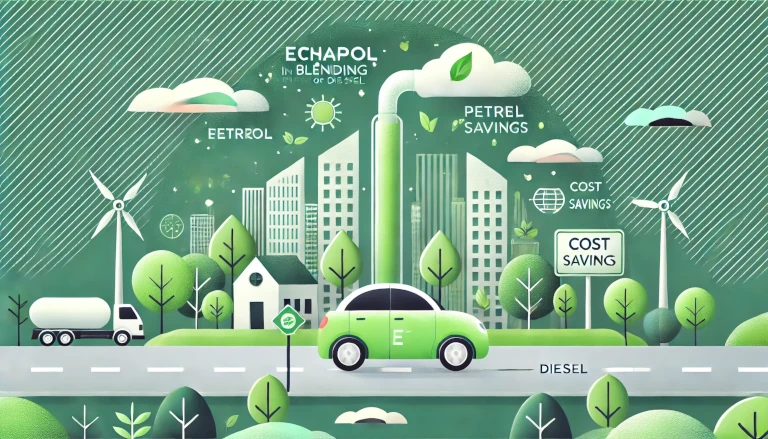With increasing concerns about pollution and climate change, the search for cleaner and more sustainable energy sources has intensified. One such alternative is ethanol, a biofuel made from renewable sources like corn, sugarcane, and other plant materials. Ethanol is often blended with gasoline to create a more environmentally friendly fuel that emits fewer pollutants. In this blog post, we will explore how ethanol helps to reduce pollution, why it is important, and how it can make a difference in the fight against climate change.
What is Ethanol?
Ethanol is an alcohol-based fuel that is derived primarily from plant materials. It can be used in vehicles as an alternative to fossil fuels, and is commonly blended with gasoline to reduce harmful emissions. Ethanol is typically produced through a process known as fermentation, where plant sugars are converted into alcohol. The most common ethanol blend is E10, which consists of 10% ethanol and 90% gasoline. Some vehicles, known as flex-fuel vehicles, can run on higher ethanol blends, like E85, which contains 85% ethanol.
How Ethanol Helps Reduce Pollution
- Lower Greenhouse Gas Emissions
Ethanol helps reduce pollution by lowering the amount of greenhouse gases (GHGs) released into the atmosphere when compared to traditional fossil fuels like gasoline. Ethanol is a biofuel, meaning it is made from renewable plant materials that absorb carbon dioxide (CO2) during their growth. This CO2 absorption helps offset some of the emissions produced during ethanol combustion, leading to an overall reduction in GHGs.
Example:
A car running on E85 (85% ethanol) emits fewer greenhouse gases than a car running on regular gasoline, helping reduce the carbon footprint.
- Reduction of Harmful Pollutants
Ethanol burns cleaner than gasoline, producing fewer harmful pollutants such as carbon monoxide (CO), sulfur oxides (SOx), and nitrogen oxides (NOx). These pollutants contribute to poor air quality and can cause respiratory issues and environmental problems like acid rain. By using ethanol-blended fuels, the release of these pollutants is significantly reduced.
Example:
In areas where ethanol-blended fuels are widely used, air quality tends to improve due to the reduction of pollutants from vehicle exhaust.
- Decreases Dependence on Fossil Fuels
The use of ethanol helps decrease the reliance on non-renewable fossil fuels, which are a major source of pollution. Fossil fuels, such as coal, oil, and natural gas, release large amounts of CO2 and other harmful emissions when burned. Ethanol, on the other hand, is derived from renewable resources, making it a more sustainable option.
Example:
Brazil is a global leader in ethanol production, primarily using sugarcane to create ethanol. The country has significantly reduced its dependence on gasoline by adopting ethanol as a primary fuel source, helping to lower emissions.
Benefits of Using Ethanol
- Supports Renewable Energy
Ethanol is made from renewable resources like corn, sugarcane, and other plant materials. These plants can be grown each year, making ethanol a more sustainable alternative to fossil fuels. Additionally, the use of biofuels helps promote agricultural economies and reduces reliance on depleting natural resources. - Improves Engine Performance
Ethanol-blended fuels can help improve engine efficiency by increasing the fuel’s octane rating. This higher octane level leads to better engine performance and helps prevent engine knocking. Flex-fuel vehicles, which can run on high ethanol blends, benefit from this enhanced performance while contributing to lower emissions. - Economic Growth
The production of ethanol helps boost local economies, especially in rural areas where crops like corn and sugarcane are grown. Ethanol production creates jobs in agriculture, refining, and distribution, supporting economic development.
Real-Life Example: Ethanol in the U.S.
In the United States, ethanol is widely used as a fuel additive, primarily in the form of E10, which contains 10% ethanol and 90% gasoline. The Renewable Fuel Standard (RFS) is a government program that mandates the blending of renewable fuels like ethanol into the nation’s fuel supply. As a result, millions of vehicles in the U.S. run on ethanol-blended fuels, contributing to lower emissions and reduced reliance on foreign oil.
Challenges and Limitations of Ethanol
While ethanol offers many environmental benefits, there are also challenges to its widespread adoption:
- Land Use and Food Supply
Ethanol production requires large amounts of crops like corn and sugarcane, which can lead to concerns about land use and the diversion of food crops for fuel production. Critics argue that using food crops for fuel could impact food prices and availability. - Energy Balance
The energy required to grow crops, transport them, and produce ethanol can sometimes offset the environmental benefits. However, advancements in cellulosic ethanol, which uses non-food plant materials, could help address this issue.
The Future of Ethanol and Pollution Reduction
Ethanol is expected to play a significant role in the future of clean energy. As governments and industries work to meet global climate goals, biofuels like ethanol will become increasingly important in reducing pollution. Advancements in second-generation biofuels, such as cellulosic ethanol made from non-food crops, could further enhance ethanol’s environmental benefits.
Ethanol is a promising solution for reducing pollution and supporting a cleaner environment. By lowering greenhouse gas emissions, reducing harmful pollutants, and promoting the use of renewable resources, ethanol helps pave the way toward a more sustainable future. Whether it’s through blending ethanol with gasoline or advancing biofuel technology, ethanol is making a positive impact in the fight against climate change.
Read this in Marathi at इथेनॉल कसे प्रदूषण कमी करते आणि स्वच्छ पर्यावरणाला समर्थन देते?
Discover more from Green Ecosystem - Renewable Energy, Agriculture, and Environmental Sustainability
Subscribe to get the latest posts sent to your email.
